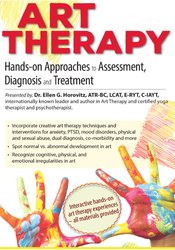
×

Do you have clients who are stuck, repeating the same patterns over and over and you feel powerless to help them? Are they often resistant to the interventions you offer?
Join internationally known art therapist, Dr. Ellen Horovitz, in this hands-on workshop where she will show you how to incorporate expressive art therapies into your practice in a disarming, imaginative and emotionally-safe manner.
Reach your most resistant patients with evidence-based practices that cut through an array of disorders, including mood, personality, developmental-learning, eating and body disorders. You’ll learn to identify both normal and abnormal artwork from cognitive, physical, emotional and developmental platforms. Add value to your clinical practice by learning creative art therapy modalities that succeed with individuals, couples and families.
Patient video footage of difficult case studies and active hands-on participation will demonstrate how to incorporate these assessments and modalities into your practice. No prior experience necessary!
NOTE: Tuition includes one free CE Certificate (participant will be able to print the certificate of completion after passing the online post-test (80% passing score) and completing the evaluation). Instructional methods will include PowerPoint, didactic lecture, and others.
Continuing Education Information: Listed below are the continuing education credit(s) currently available for this non-interactive self-study package. Program content is reviewed periodically per accrediting board rules for currency and appropriateness for credit. Credit approvals are subject to change. Please note, your licensing board dictates whether self-study is an acceptable form of continuing education, as well as which credit types are acceptable for continuing education hours. Please refer to your licensing board's rules and regulations. If your profession is not listed, please contact your licensing board to determine your continuing education requirements and check for reciprocal approval.
For other credit inquiries not specified below, please contact info@pesi.com or 800-844-8260 before purchase.
Materials that are included in this course may include interventions and modalities that are beyond the authorized practice of your profession. As a licensed professional, you are responsible for reviewing the scope of practice, including activities that are defined in law as beyond the boundaries of practice in accordance with and in compliance with your profession's standards.
For Planning Committee disclosures, please see the statement above. For speaker disclosures, please see the faculty biography.
Earn up to 6.0 CE hours. Please see below, for more details, as credit amounts vary by jurisdiction and profession.

PESI, Inc., #1062, is approved as an ACE provider to offer social work continuing education by the Association of Social Work Boards (ASWB) Approved Continuing Education (ACE) program. Regulatory boards are the final authority on courses accepted for continuing education credit. ACE provider approval period: January 27, 2023 - January 27, 2026. Social workers completing this course receive 6.0 Clinical continuing education credits.
Course Level: Intermediate Format: Recorded asynchronous distance. Full attendance is required; no partial credits will be offered for partial attendance.
Canadian Social Workers: Canadian provinces may accept activities approved by the ASWB for ongoing professional development.
PESI, Inc. is approved by the Canadian Psychological Association to offer continuing education for psychologists. PESI, Inc. maintains responsibility for the program. This program is approved for 6.0 self-study continuing education hours. Full credit statement at: www.pesi.com/cpa-statement
This self-study activity qualifies for 6.0 continuing education clock hours as required by many national, state and local licensing boards and professional organizations. Save your activity advertisement and certificate of completion, and contact your own board or organization for specific requirements.
| File type | File name | Number of pages | |
|---|---|---|---|
| Manual (11.53 MB) | 60 Pages | Available after Purchase | |
| Instructions for ASHA Credit - SELF STUDY ONLY - 04/11/18 (0.03 MB) | Available after Purchase | ||
| Manual - French (11.53 MB) | 60 Pages | Available after Purchase | |
| Manual - Italian (11.53 MB) | 60 Pages | Available after Purchase |
Access never expires for this product.
Visit our FAQ page at https://www.pesicanada.com/faq or contact us at https://www.pesicanada.com/contact-us
Satisfaction Guarantee
Your satisfaction is our goal and our guarantee. Concerns should be addressed to info@pesicanada.com.
Please wait ...